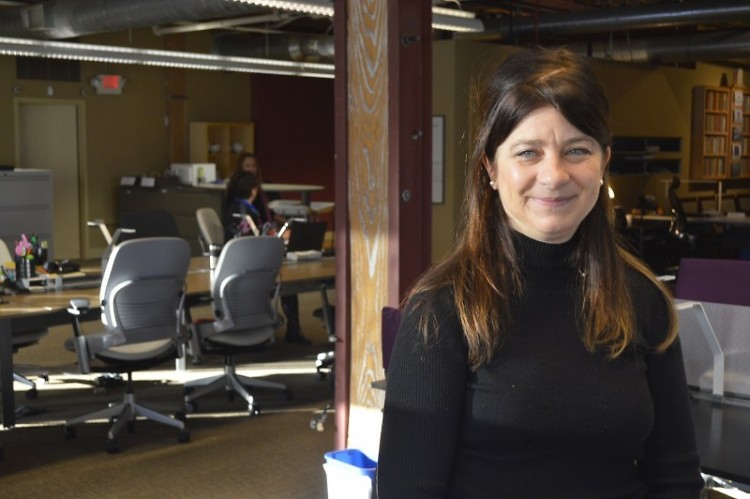Wendy Falb vividly remembers cleaning the filthy steps of Fountain School one day, back when her older son attended Montessori School there. Fixing up the old school was one of her many volunteer tasks as a self-described “tiger mom.”
“My child’s teacher was like, ‘Wendy, I think there’s a different calling for you here at this school,’” Falb recalls with a laugh.
Indeed there was. Before long, Falb was elected to the Grand Rapids Board of Education, in 2009. She is now serving her second term, which ends in 2018, and her second stint as board president. In this role she is tiger mom to not only her two sons at City High/Middle School, but to the nearly 17,000 students in GRPS.
She still feels it’s a kind of calling, although tougher than scrubbing the stairs. Despite the dramatic gains the district has made in recent years, Falb sees a “fragility” in urban public schools struggling with poverty and more. School boards constantly contend with many different perspectives -- from parents, staff, legislators and others.
“So often those perspectives are at odds, and the potential for breakdown is always huge,” Falb says. “I really feel my work is to try to see all those perspectives and hold them together, and discern a way forward based on those perspectives.”
She’s speaking in her office at the Literacy Center of West Michigan, where she is executive director. Overseeing the tutoring in English of adults, some of them parents of GRPS immigrant students, returns her to her original field of teaching. A graduate of Calvin College, she taught English as a graduate student at Boston College and at a technical school there before returning to West Michigan. She was an adjunct at Calvin and Grand Valley State University and earned a Ph.D. at Michigan State University.
Raised in Hudsonville, she attended Christian schools where she played flute in the band and was active in theater and debate. “I was an overachiever,” she admits with a smile. “I loved school. I love that educational moment.”
From parent advocate to board president
That love of learning has sustained her since, from teacher to Montessori PTO leader to board member, and through two bouts of breast cancer.
“Education changes who you are and your relationship to the rest of the world,” Falb says. “It gives you curiosity, so you can learn and go deeper into the world.”
Her passion for education drove her to become active in the Montessori schooling of her sons, Karl and Peter. She became a strong proponent of Grand Rapids Public Schools and urged her neighbors to enroll their children in them. “People would run from me when they had strollers,” she jokes.
But she wasn’t laughing when she argued before the school board that it shouldn’t close the old Iroquois School, where the Montessori program was then located. After the meeting, she says, then Superintendent Bert Bleke pulled her aside and said, “You should run for the board.”
She eventually did, prodded by board member Tony Baker and by her conviction that she could make a difference.
“From the first few months of putting my child in Grand Rapids Public Schools, it was so clear to me how undervalued the school system was,” as well as the teachers and students, she says. “How much was there, and how much more could be accomplished if more support was given. The work was so doable, and the consequences of not doing the work were pretty serious.”
But after being elected she found herself in a tumultuous time, as relations between then Superintendent Bernard Taylor and the teachers union were at a low point. “It was really painful,” she recalls. “I had no idea what I was walking into.”
Steep learning curve, but rewarding
However, she says the district has been on “a great trajectory” under Superintendent Teresa Weatherall Neal, whom she calls “an extraordinary gift” to the district. Still, the state of urban schools remains fragile, ever threatened by funding cuts and the push for charters and vouchers coming from the Trump administration, she cautions. And she has learned difficult lessons about the sometimes “irreconcilable perspectives” of different racial and ethnic groups.
“It has deepened my understanding of structural racism in Grand Rapids, and how much work needs to happen,” she says. “’I’m very grateful for that.”
Along with the constant need to absorb new information about the finances and governance of a 50-school district, she adds, “It’s a big learning curve for $300 a month.”
Asked what she would say to a class of high school students about the importance of education, Falb takes a long pause. Then she speaks of the tools school offers students to grow and gain competency for life.
“Don’t shy away from this opportunity in school,” she says she would tell them. “Get everything you can out of it, so that you can be that leader,” whether in marriage, family, church, community or work. “Be that person who knows how to learn, and knows how to lead.”
The Rapidian, a program of the 501(c)3 nonprofit Community Media Center, relies on the community’s support to help cover the cost of training reporters and publishing content.
We need your help.
If each of our readers and content creators who values this community platform help support its creation and maintenance, The Rapidian can continue to educate and facilitate a conversation around issues for years to come.
Please support The Rapidian and make a contribution today.
